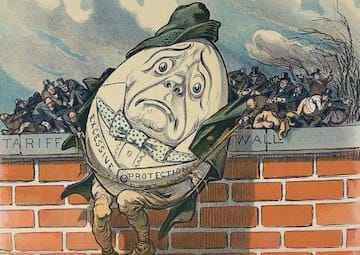ALICE was too much puzzled to say anything, so after a minute Humpty Dumpty began again. ‘They’ve a temper, some of them — particularly verbs, they’re the proudest — adjectives you can do anything with, but not verbs — however, I can manage the whole lot of them! Impenetrability! That’s what I say!’
‘Would you tell me, please,’ said Alice ‘what that means?’
‘Now you talk like a reasonable child,’ said Humpty Dumpty, looking very much pleased. ‘I meant by “impenetrability” that we’ve had enough of that subject, and it would be just as well if you’d mention what you mean to do next, as I suppose you don’t mean to stop here all the rest of your life.’
‘That’s a great deal to make one word mean,’ Alice said in a thoughtful tone.
‘When I make a word do a lot of work like that,’ said Humpty Dumpty, ‘I always pay it extra.’
slightly abridged
Distinguished philologist Alexander Ellis (the prototype of Professor Higgins in George Bernard Shaw’s ‘Pygmalion’) said of Carroll’s Humpty Dumpty: “Humpty Dumpty is a perfect type of your philosophical-language-monger. If he does not make words himself on an individual classification, he gives new meanings to old words until he loses the social character of language entirely, and locks himself into a box as effectually as the poor bride in the ‘Mistletoe Bough!’, leaving future generations to find bare bones and wonder how they got there”. From President’s Address to the Philological Society, 1872; and see The Legend of the Mistletoe Bough (Wikipedia).


